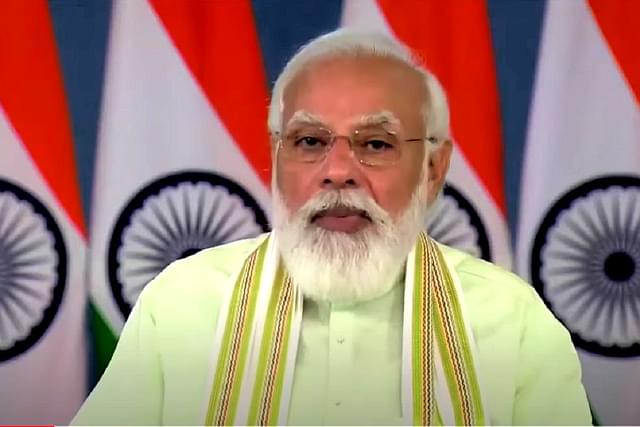Launching 35 crop varieties with “special traits like climate resilience and higher nutrient content”, Prime Minister Narendra Modi on Tuesday called upon the academicians, agricultural scientists and institutions to start a campaign to impart knowledge to farmers about “protection” from climate change.
Speaking on the occasion, via video conferencing, the Prime Minister said, “Aaj main sabhee shikshaavidon, sabhee krishi vaigyaanikon, sabhee sansthaanon ko kahoonga ki aap bhee aazaadee ke amrit mahotsav ke lie apane lakshy tay karen. 75 din ka abhiyaan utha le koee. 75 gaanvon ko god lekar ke parivartan ka abhiyaan utha le. 75 skoolon ko jaagarook karake harek skool ko koee kaam mein laga de. (Today I will ask all the academicians, all the agricultural scientists, all the institutions that you too should set your goals for the Amrit Mahotsav of Azadi. Start a 75-day campaign. Take up the campaign for change by adopting 75 villages. Spread awareness in 75 schools and put each school in some work.)”
isa ek abhiyaan desh ke har jile mein apane star par bhee aur sansthaanon ke star par bhee chalaaya ja sakata hai. isamen naee phasalon, fortified beejon, jalavaayu parivartan se bachaav ko lekar kisaanon ko jaanakaaree dee ja sakatee hai… ham sab ka prayaas mausam ke badalaav se desh kee khetee ko bachaega. kisaan kee samrddhi aur desh ke svaasthy kee suraksha bhee sunishchit karega. (Such a campaign can be launched in every district of the country at an individual level and also at the level of institutions. In this, information can be given to farmers about new crops, fortified seeds, protection from climate change… The effort of all of us will save the country’s agriculture from climate change. It will also ensure the prosperity of the farmer and the health security of the country.),” Modi said.
Modi said that he has made a similar request to Olympic champions to spread awareness about malnutrition. “I urged every athlete to attend at least 75 schools in the coming year or two and talk to students there about nutrition, sports and physical exercise.”
The Prime Minister observed that due to climate change, new types of pests, new diseases, epidemics are emerging, because of this, there is a big threat to the health of humans and livestock and crops are also being affected.
Intensive continued research on these aspects is necessary, he said adding that when science, government and society work together, results will be better.
Such an alliance of farmers and scientists will strengthen the country in dealing with new challenges, he added.
On this occasion, the Prime Minister also inaugurated the newly constructed campus of the National Institute of Biotic Stress Management Raipur and distributed the Green Campus Award to Agricultural Universities. He also interacted with 5 farmers–Zaitoon Begum of Ganderbal, Jammu and Kashmir; Kulwant Singh, a farmer and seed producer of Bulandshahr, Uttar Pradesh; Darshana Pedenkar, from Bardez, Goa; Thoiba Singh from Manipur, and Suresh Rana, Udham Singh Nagar, Uttarakhand.
Incidentally, 4 of these 5 farmers belonged to the four poll bound states – Uttar Pradesh, Uttarkhand, Manipur and Goa–, where assembly elections are due early next year.
The crop varieties, which the Prime Minister launched on Tuesday, have been developed by the Indian Council of Agricultural Research (ICAR) to “address the twin challenges of climate change and malnutrition.”
According to an official statement, “Thirty-five such crop varieties with special traits like climate resilience and higher nutrient content have been developed in the year 2021.”
“These include a drought tolerant variety of chickpea, wilt and sterility mosaic resistant pigeonpea, early maturing variety of soybean, disease resistant varieties of rice and biofortified varieties of wheat, pearl millet, maize and chickpea, quinoa, buckwheat, winged bean and faba bean,” said the statement issued by the Prime Minister’s Office on Monday.
These special traits crop varieties also include those that address the anti-nutritional factors found in some crops that adversely affect human and animal health. Examples of such varieties include Pusa Double Zero Mustard 33, first Canola quality hybrid RCH 1 with <2% erucic acid and <30 ppm glucosinolates and a soybean variety free from two anti-nutritional factors namely Kunitz trypsin inhibitor and lipoxygenase,” the statement said.
“Other varieties with special traits have been developed in soybean, sorghum, and baby corn, among others,” it added.







Leave a Reply